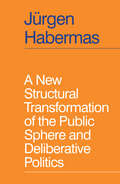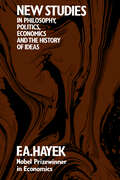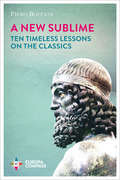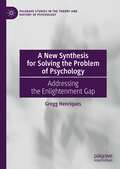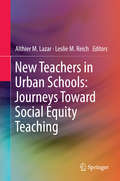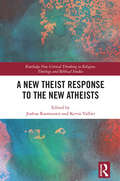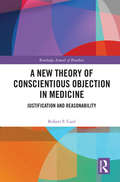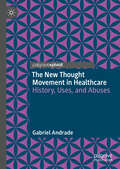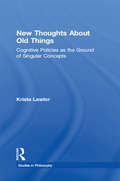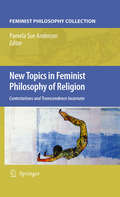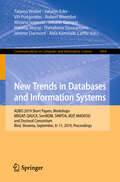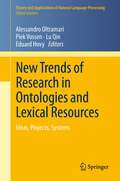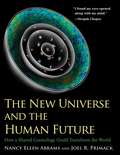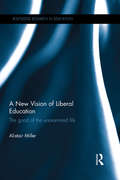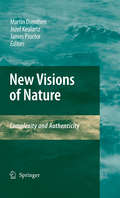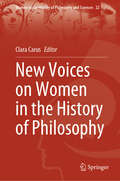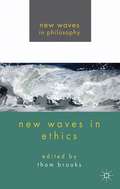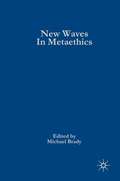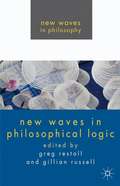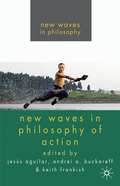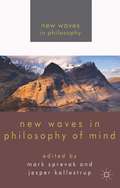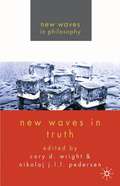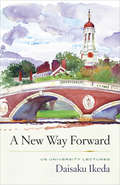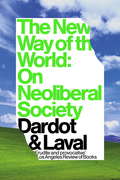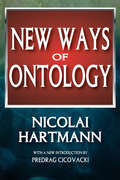- Table View
- List View
A New Structural Transformation of the Public Sphere and Deliberative Politics
by Jürgen HabermasJürgen Habermas’s book The Structural Transformation of the Public Sphere, first published in 1962, has long been recognized as one of the most important works of twentieth-century social thought. Blending philosophy and social history, it offered an account of the public sphere as a domain that mediates between civil society and the state in which citizens could discuss matters of common concern and participate in democratic decision-making through the formation of public opinion. Now, in view of the digital revolution and the resulting crisis of democracy, he returns to this important topic. In this new book Habermas focuses on digital media, in particular social media, which are increasingly relegating traditional mass media to the background. While the new media initially promised to empower users, this promise is being undermined by their algorithm-steered platform structure that promotes self-enclosed informational ‘bubbles’ and discursive ‘echo chambers’ in which users split into a plurality of pseudo-publics that are largely closed off from one other. Habermas argues that, without appropriate regulation of digital media, this new structural transformation is in danger of hollowing out the institutions through which democracies can shape social and economic processes and address urgent collective problems, ranging from growing social inequality to the climate crisis.
New Studies in Philosophy, Politics, Economics and the History of Ideas
by F. A. HayekFrom a Nobel Laureate economist, a collection of essays outlining ideas on political theory, economic freedom and epistemology.Following on F. A. Hayek’s previous work Studies in Philosophy, Politics, and Economics (1967), New Studies in Philosophy, Politics, Economics and the History of Ideas collects some of Hayek’s most notable essays and lectures dealing with problems of philosophy, politics and economics, with many of the essays falling into more than one of these categories. Expanding upon the previous volume the present work also includes a fourth part collecting a series of Hayek’s writings under the heading “History of Ideas.”Of the articles contained in this volume the lectures on “The Errors of Constructivism”and “Competition as a Discovery Procedure” have been published before only in German, while the article on “Liberalism” was written in English to be published in an Italian translation in the Enciclopedia del Novicento by the Istituto della Enciclopedia Italiana at Rome.
A New Sublime: Ten Timeless Lessons on the Classics
by Piero BoitaniIn a book &“as bewitching and entertaining as a novel&” a renowned Italian literary critic &“uncovers the unexpected, extraordinary modernity of the classics&” (Piero Dorfles). In A New Sublime, literary critic Piero Boitani reveals the timeless beauty and wisdom of ancient literature, highlighting its profound and surprising connections to the present. Ranging from Homer to Tacitus, with Thucydides, Aristotle, Sophocles, Cicero, and many others in between, Boitani&’s fresh and inspiring insights remind us of the enduring importance and beauty of the classics of the Western canon. Boitani explores what the classics have to say about the mutability and fluidity of identity and matter, the power and position of women in society. He also looks closely at their depictions of force and subjugation, fate and free will, the ethical life, hospitality, love, compassion, and mysticism. Through it all, he shows how the classics can play active roles in our contemporary lives.
A New Synthesis for Solving the Problem of Psychology: Addressing the Enlightenment Gap (Palgrave Studies in the Theory and History of Psychology)
by Gregg HenriquesIn this incisive analysis of academic psychology, Gregg Henriques examines the fragmented nature of the discipline and explains why the field has had enormous difficulty specifying its subject matter and how this has limited its ability to advance our knowledge of the human condition. He traces the origins of the problem of psychology to a deep and profound gap in our knowledge systems that emerged in the context of the scientific Enlightenment.To address this problem, this book introduces a new vision for scientific psychology called mental behaviorism. The approach is anchored to a comprehensive metapsychological framework that integrates insights from physics and cosmic evolution, neuroscience, the cognitive and behavioral sciences, developmental and complex adaptive systems theory, attachment theory, phenomenology, and social constructionist perspectives and is well grounded in the philosophy of science. Building on more than twenty years of work in theoretical psychology and drawing on a wide range of literature, Professor Henriques shows how this new approach to scientific knowledge fills in the gaps of our current understanding of psychology and can allow us to develop a more holistic and sophisticated way to understand animal and human mental behavioral patterns. This work will especially appeal to students and scholars of general psychology and theoretical psychology, as well as to historians and philosophers of science.
New Teachers in Urban Schools: Journeys Toward Social Equity Teaching
by Althier M. Lazar Leslie M. ReichThis volume informs the reader about new teachers in urban underserved schools and their development as teachers for social equity. The accounts of five novice teachers who grew up outside the communities in which they teach lead to chapters that contain advice for teacher educators, future and current teachers, and school leaders. These early career teachers learned much about bridging the cultural divide between themselves and their students, confronted and resolved big challenges that may immobilize some who set out to teach in these communities. They brought to their classrooms strong social justice orientations, including a moral imperative to make a difference in the world, an awareness of social and educational inequalities, and a strong sense of responsibility to positively influence the life trajectories of students in their charge. Their narratives offer insights on the dispositions and contexts that will help early career teachers survive and thrive and make a difference in their students' lives.
A New Theist Response to the New Atheists (Routledge New Critical Thinking in Religion, Theology and Biblical Studies)
by Joshua Rasmussen Kevin VallierIn response to the intellectual movement of New Atheism, this volume articulates a "New Theist" response that has at its core a desire to engage in productive and depolarizing dialogue. To ensure this book is of interest to atheists and theists alike, a team of experts in the field of philosophy of religion offer an assessment of the strongest New Atheist arguments. The chapters address the most pertinent questions about God, including politics and morality, and each essay shows how a reflective theist might deal with points raised by the New Atheists. This volume is a serious academic engagement with the questions asked by New Atheism. As such, it will be of significant interest to scholars working in the philosophy of religion and theology, as well as those engaged in religious studies generally.
A New Theory of Conscientious Objection in Medicine: Justification and Reasonability (Routledge Annals of Bioethics)
by Robert F. CardThis book argues that a conscientiously objecting medical professional should receive an exemption only if the grounds of an objector’s refusal are reasonable. It defends a detailed, contextual account of public reasonability suited for healthcare, which builds from the overarching concept of Rawlsian public reason. The author analyzes the main competing positions and maintains that these other views fail precisely due to their systematic inattention to the grounding reasons behind a conscientious objection; he argues that any such view is plausible to the extent that it mimics the ‘reason-giving requirement’ for conscience objections defended in this work. Only reasonable objections can defeat the prior professional obligation to assign primacy to patient well-being, therefore one who refuses a patient’s request for a legally available, medically indicated, and safe service must be able to explain the grounds of their objection in terms understandable to other citizens within the public institutional structure of medicine. The book further offers a novel policy proposal to deploy the Reasonability View: establishing conscientious objector status in medicine. It concludes that the Reasonability View is a viable and attractive position in this debate. A New Theory of Conscientious Objection in Medicine: Justification and Reasonability will be of interest to researchers and advanced students working in bioethics, medical ethics, and philosophy of medicine, as well as thinkers interested in the intersections between law, medical humanities, and philosophy.
The New Thought Movement in Healthcare: History, Uses, and Abuses
by Gabriel AndradeThis book delves into the evolution of the New Thought Movement and its pervasive influence on modern healthcare. The book begins by tracing the roots of the New Thought Movement, originating in the 19th century, emphasizing the power of the mind in healing and personal development. Over time, this philosophy morphed into the contemporary positive thinking industry, becoming a significant component of Western self-help culture. The book explores how these ideas have become a contentious point in today's culture wars, polarized between supporters who credit it for personal empowerment and critics who highlight its limitations and potential harm. Central to the discussion is an in-depth analysis of the New Thought philosophy's impact on the healthcare industry. While acknowledging the potential benefits, such as motivating patients to adopt healthier lifestyles and fostering a sense of personal agency, the book critically examines how this philosophy's emphasis on mental positivity can lead to victim-blaming. It argues that oversimplifying health issues by attributing them solely to personal mindset obscures the multifaceted reality of health, particularly the significant role of social determinants of health and systemic inequities. This critique underscores how attributing illness to insufficient positive thinking can perpetuate stigma and neglect the socio-economic and environmental factors critical for understanding and addressing health challenges. By offering a nuanced perspective, the book aims to catalyze discussions on integrating mindful optimism with a holistic acknowledgment of the complexities inherent in healthcare, striving for a more balanced and equitable approach
New Thoughts About Old Things: Cognitive Policies as the Ground of Singular Concepts
by Krista LawlorThis book defends a novel theory of singular concepts, emphasizing the pragmatic requirements of singular concept possession and arguing that these requirements must be understood to institute traditions and policies of thought.
New Topics in Feminist Philosophy of Religion
by Pamela Sue AndersonHaving enjoyed more than a decade of lively critique and creativity, feminist philosophy of religion continues to be a vital field of inquiry. New Topics in Feminist Philosophy of Religion maintains this vitality with both women and men, from their own distinctive social and material locations, contributing critically to the rich traditions in philosophy of religion. The twenty contributors open up new possibilities for spiritual practice, while contesting the gender-bias of traditional concepts in the field: the old models of human and divine will no longer 'simply do'! A lively current debate develops in re-imagining and revaluing transcendence in terms of body, space and self-other relations. This collection is an excellent source for courses in feminist philosophy, phenomenology, hermeneutics and literature, Continental and analytical philosophy of religion, engaging with a range of religions and philosophers including Kant, Kierkegaard, Marx, Heidegger, Arendt, Weil, Beauvoir, Merleau-Ponty, Ricoeur, Levinas, Irigaray, Bourdieu, Kristeva, Le Doeuff, bell hooks and Jantzen.
New Trends in Databases and Information Systems: ADBIS 2019 Short Papers, Workshops BBIGAP, QAUCA, SemBDM, SIMPDA, M2P, MADEISD, and Doctoral Consortium, Bled, Slovenia, September 8–11, 2019, Proceedings (Communications in Computer and Information Science #1064)
by Tatjana Welzer Johann Eder Vili Podgorelec Robert Wrembel Mirjana Ivanović Johann Gamper Mikoƚaj Morzy Theodoros Tzouramanis Jérôme Darmont Aida Kamišalić LatifićThis book constitutes the thoroughly refereed short papers, workshops and doctoral consortium papers of the 23rd European Conference on Advances in Databases and Information Systems, ADBIS 2019, held in Bled, Slovenia, in September 2019.The 19 short research papers and the 5 doctoral consortium papers were carefully reviewed and selected from 103 submissions, and the 31 workshop papers were selected out of 67 submitted papers. The papers are organized in the following sections: Short Papers; Workshops Papers; Doctoral Consortium Papers; and cover a wide spectrum of topics related to database and information systems technologies for advanced applications.
New Trends of Research in Ontologies and Lexical Resources
by Eduard Hovy Alessandro Oltramari Piek Vossen Lu QinIn order to exchange knowledge, humans need to share a common lexicon of words as well as to access the world models underlying that lexicon. What is a natural process for a human turns out to be an extremely hard task for a machine: computers can't represent knowledge as effectively as humans do, which hampers, for example, meaning disambiguation and communication. Applied ontologies and NLP have been developed to face these challenges. Integrating ontologies with (possibly multilingual) lexical resources is an essential requirement to make human language understandable by machines, and also to enable interoperability and computability across information systems and, ultimately, in the Web. This book explores recent advances in the integration of ontologies and lexical resources, including questions such as building the required infrastructure (e.g., the Semantic Web) and different formalisms, methods and platforms for eliciting, analyzing and encoding knowledge contents (e.g., multimedia, emotions, events, etc.). The contributors look towards next-generation technologies, shifting the focus from the state of the art to the future of Ontologies and Lexical Resources. This work will be of interest to research scientists, graduate students, and professionals in the fields of knowledge engineering, computational linguistics, and semantic technologies.
The New Universe and the Human Future: How a Shared Cosmology Could Transform the World (The Terry Lectures Series) (The Terry Lectures Series)
by Nancy Ellen Abrams Joel R. PrimackA cultural philosopher and an astrophysicist attempt to decipher how we fit into the universe, and the impact our placement has on us. After a four-century rupture between science and the questions of value and meaning, this groundbreaking book presents an explosive and potentially life-altering idea: if the world could agree on a shared creation story based on modern cosmology and biology—a story that has just become available—it would redefine our relationship with Planet Earth and benefit all of humanity, now and into the distant future.Written in eloquent, accessible prose and illustrated in magnificent color throughout, including images from innovative simulations of the evolving universe, this book brings the new scientific picture of the universe to life. It interprets what our human place in the cosmos may mean for us and our descendants. It offers unique insights into the potential use of this newfound knowledge to find solutions to seemingly intractable global problems such as climate change and unsustainable growth. And it explains why we need to &“think cosmically, act globally&” if we're going to have a long-term, prosperous future on Earth.&“Should be read by anyone, not just scientists, who worry about the human condition.&”—Deepak Chopra, The Huffington Post&“A prophetic book. Its message ranks right up there with those of Isaiah, Jeremiah, Ezekiel, and Joel. Like the prophets, it is at times poetic, demanding, grounded, soaring, empowering, and always awe-inspiring.&”—Matthew Fox, Tikkun&“The ideas and images are fascinating and certainly contribute to a sense of the profound stakes involved in what we&’re doing to the planet and ourselves.&”—William Kowinski, North Coast Journal
A New Vision of Liberal Education: The good of the unexamined life (Routledge Research in Education)
by Alistair Miller‘This is an extremely important book. Wonderfully well researched and written, it develops a powerful argument about how we should conceive of the aims of education and design curricula. It should define the field for a very considerable period of time.’ - Professor Michael J Reiss, Institute of Education, University of London, UK Many philosophers of education believe that the main aim of education is to endow students with personal autonomy, producing citizens who are reflective, make rational choices, and submit their values and beliefs to critical scrutiny. This book argues that the ‘good life’ need not be the life of the philosopher, politician or critical thinker, but that an ordinary ‘unexamined’ life is also worth living. Central to this ethical life is the engagement in worthwhile activities or ‘practices’, and the best way to prepare pupils for their engagement in these practices is to cultivate a range of moral and intellectual virtues. In this book, Alistair Miller brings together a range of philosophical and historical perspectives to argue for a new vision of liberal education: liberal in the sense that it forms a moral and cultural inheritance, new in the sense that it would enable all pupils to lead flourishing lives. Divided into two sections, the first part of the book seeks to establish the justified aims of education in a liberal democratic society; the second part explores the nature of the school curriculum that might realise these aims. A New Vision of Liberal Education will appeal to researchers, academics and postgraduate students in the fields of philosophy of education, moral and values education, liberal education, and curriculum studies.
New Visions of Nature
by James Proctor F.W. Jozef Keulartz Martin A. Drenthen"New Visions of Nature" focuses on the emergence of these new visions of complex nature in three domains. The first selection of essays reflects public visions of nature, that is, nature as it is experienced, encountered, and instrumentalized by diverse publics. The second selection zooms in on micro nature and explores the world of contemporary genomics. The final section returns to the macro world and discusses the ethics of place in present-day landscape philosophy and environmental ethics. The contributions to this volume explore perceptual and conceptual boundaries between the human and the natural, or between an 'out there' and 'in here.' They attempt to specify how nature has been publicly and genomically constructed, known and described through metaphors and re-envisioned in terms of landscape and place. By parsing out and rendering explicit these divergent views, the volume asks for a re-thinking of our relationship with nature.
New Voices on Women in the History of Philosophy (Women in the History of Philosophy and Sciences #22)
by Clara CarusThis book promotes entirely new insights into women’s contributions to the history of philosophy and boasts papers spanning the centuries from Antigone until twentieth century phenomenology, covering fields from logic to mysticism, stretching from Brazil to Early Modern Europe. The book is of interest for all scholars and students of the history of philosophy, but especially for those who are interested in women philosophers and in new narratives in the history of philosophy. The book is representative of the immense scope of academic discussion women were involved in over the centuries as well as their varying styles and methods. It features papers in logic and in mysticism, presents papers on female authors in Antiquity and in the twenty-first century and it includes papers on phenomenology and analytic philosophy. The chapters consider philosophical positions in literature and drama, in letters and in classical philosophical treatises, ensuring this book contributes significantly to research on the individual women authors, who are all to date still understudied figures.
New Waves in Ethics
by Thom BrooksBringing together the leading future figures in ethics broadly construed with essays ranging from metaethics and normative ethics to applied ethics and political philosophy, topics include new work on experimental philosophy, feminism, and global justice incorporating perspectives informed from historical and contemporary approaches alike.
New Waves in Metaethics
by Michael BradyMetaethics occupies a central place in analytical philosophy, and the last forty years has seen an upsurge of interest in questions about the nature and practice of morality. This collection presents original and ground-breaking research on metaethical issues from some of the very best of a new generation of philosophers working in this field.
New Waves in Philosophical Logic
by Greg Restall Gillian RussellPhilosophical logic has been, and continues to be, a driving force behind much progress and development in philosophy more broadly. This collection by up-and-coming philosophical logicians deals with a broad range of topics, including, for example, proof-theory, probability, context-sensitivity, dialetheism and dynamic semantics.
New Waves in Philosophy of Action
by Jes 250 S H. Aguilar Andrei A. Buckareff Keith FrankishA collection of original, state-of-the-art essays by some of the best young philosophers working on the myriad problems of action and agency. Each one has already made important contributions to the philosophy of action and cognate areas. The chapters reflect their research and make a significant contribution to some debate in the field.
New Waves in Philosophy of Mind
by Mark Sprevak Jesper KallestrupPhilosophy of mind is one of the core disciplines in philosophy. The questions that it deals with are profound, vexed and intriguing. This volume of 15 new cutting-edge essays gives young researchers a chance to stir up new ideas. The topics covered include the nature of consciousness, cognition, and action.
New Waves in Truth
by Cory D. Wright Nikolaj J. L. L. PedersenWhat is truth? Philosophers are interested in a range of issues involving the concept of truth beginning with what sorts of things can be true. This is a collection of eighteen new and original research papers on truth and other alethic phenomena by twenty of the most promising young scholars working on truth today.
A New Way Forward: US University Lectures
by Daisaku Ikeda"Wisdom and compassion are intimately linked and mutually reinforcing.Compassion in Buddhism does not involve the forcible suppression ofour natural emotions, our likes and dislikes. Rather, it is the realization thateven those whom we dislike have qualities that can contribute to our livesand can afford us opportunities to grow in our own humanity."—Daisaku IkedaPeace lies along the path of humanity's growth and inner transformation. With this as a major theme, Daisaku Ikeda offers fresh insights and new ways of thinking in each of his seven US university lectures collected in A New Way Forward.These explorations on the power of dialogue, the interdependence of all life, the importance of developing in one's character the attributes of wisdom, courage, and compassion, and other topics, stir the heart and mind and lead to the inevitable conclusion that each individual holds the key to a lasting peace.
The New Way Of The World
by Christian Laval Gregory Elliott Pierre DardotExploring the genesis of neoliberalism, and the political and economic circumstances of its deployment, Pierre Dardot and Christian Laval dispel numerous common misconceptions. Neoliberalism is neither a return to classical liberalism nor the restoration of "pure" capitalism. To misinterpret neoliberalism is to fail to understand what is new about it: far from viewing the market as a natural given that limits state action, neoliberalism seeks to construct the market and make the firm a model for governments. Only once this is grasped will its opponents be able to meet the unprecedented political and intellectual challenge it poses.
New Ways of Ontology
by Predrag Cicovacki Nicolai HartmannContemporary philosophy has reasserted the belief that philosophy has practical tasks. This turn reflects an understanding that the life of the individual and the community is not molded merely by personal needs and fortunes but also by the strength of dominant ideas. For Nicolai Hartmann, ideas are spiritual powers belonging to the realm of thought, but thought has its own strict discipline and critique of events. In his view, theory must include within its scope problems of the contemporary world and cooperation in work that needs doing.New Ways of Ontology stands in opposition to the tradition of Heidegger. With deep appreciation of the history of philosophical controversy, Hartmann divides mistakes of the old ontology into those related to its method and those concerning its content. Hartmann finds a common mistake behind methodological approaches inspired by late German romanticism in attempts to develop a complete systematic account of the categories of being—not only of the ideal, but of real being.The main task of New Ways of Ontology is to reveal and analyze interdependences and interconnections. The divisions of being and becoming, of the separation of existence and essence, as well as the old view that the real and the ideal exclude each other, require revision. For Hartmann, whose ideas take us close to modern social science research, ontology is the neutral category that includes subject and object, and gets beyond old realism and modern idealism alike.
